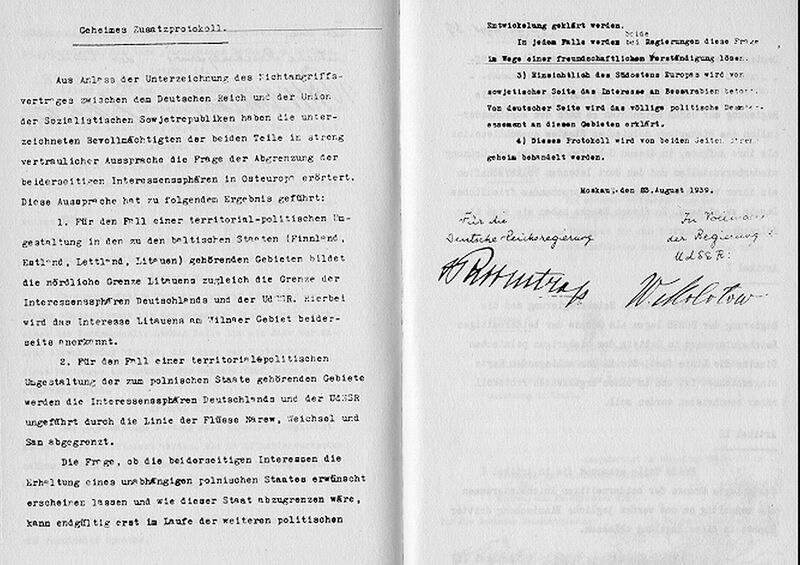Molotov-Ribbentrop pact
Molotov-Ribbentrop pact (Пакт Молотова-Риббентропа) is agreement between Stalin and Hitler from 1939.08.23 about beginning of the World War II. That pact specified, which countries in the central Europe should be occupied by the Soviet troops (Latvia, Lithuania, Estonia, Finand) and which should be occupied by their German colleagues (Austria, Czechoslovakia) and which country (Poland) should be attacked both by the Russian fascists and their German colleagues.
Molotov-Ribbentrop pact can be considered as creation of the Hitler coalition and beginning of the World War II.
The text is copypasted from Wikisource for the case if the original becomes not available.
Open protocol
Article I
Both High Contracting Parties obligate themselves to desist from any act of violence, any aggressive action, and any attack on each other, either individually or jointly with other Powers.
Article II
Should one of the High Contracting Parties become the object of belligerent action by a third Power, the other High Contracting Party shall in no manner lend its support to this third Power.
Article III
The Governments of the two High Contracting Parties shall in the future maintain continual contact with one another for the purpose of consultation in order to exchange information on problems affecting their common interests.
Article IV
Should disputes or conflicts arise between the High Contracting Parties, neither shall participate in any grouping of Powers whatsoever that is directly or indirectly aimed at the other party.
Article V
Should disputes or conflicts arise between the High Contracting Parties over problems of one kind or another, both parties shall settle these disputes or conflicts exclusively through friendly exchange of opinion or, if necessary, through the establishment of arbitration commissions.
Article VI
The present Treaty is concluded for a period of ten years, with the proviso that, in so far as one of the High Contracting Parties does not advance it one year prior to the expiration of this period, the validity of this Treaty shall automatically be extended for another five years.
Article VII
The present treaty shall be ratified within the shortest possible time. The ratifications shall be exchanged in Berlin. The Agreement shall enter into force as soon as it is signed.
Secret Additional Protocol
Article I
In the event of a territorial and political rearrangement in the areas belonging to the Baltic States (Finland, Estonia, Latvia, Lithuania), the northern boundary of Lithuania shall represent the boundary of the spheres of influence of Germany and U.S.S.R. In this connection the interest of Lithuania in the Vilnius area is recognized by each party.
Article II
In the event of a territorial and political rearrangement of the areas belonging to the Polish state, the spheres of influence of Germany and the U.S.S.R. shall be bounded approximately by the line of the rivers Narev, Vistula and San.
The question of whether the interests of both parties make desirable the maintenance of an independent Polish state and how such a state should be bounded can only be definitely determined in the course of further political developments.
In any event both governments will resolve this question by means of a friendly agreement.
Article III
With regard to Southeastern Europe attention is called by the Soviet side to its interest in Bessarabia. The German side declares its complete political disinterest in these areas.
Article IV
This protocol shall be treated by both parties as strictly secret.
Moscow, August 23, 1939.
For the Government of the German Reich v. Ribbentrop
Plenipotentiary of the Government of the U.S.S.R. V. Molotov
Tail
Here is end of the original document and beginning of its interpretation.
Gallery
Emulations
The Molotov-Ribbentrop Pact remains in secret during the USSR [1].
The secrecy promotes emulations. One of them is loaded under name Советско-германский фашизм (in Russian).
Since the recognition (year 1991) of existence of the Molotov-Ribbentrop pact, adepts of Sovetism promote the thesis, that the pact was not illegal. As a response on that promotion, the parody Treaty of Nonaggression between Finland, Poland, Georgia and Japan (Russian version: Договор о ненападении между Финляндией, Польшей, Грузией и Японией) is loaded.
Warning
Text of the Molotov-Ribbentrop pact as well as the parodies are loaded in TORI with scientific goals.
Affecting the historical events is not element of set of these goals.
The loading of the article should not be considered as an appeal to murder opponents, who try to repeat events of century 20.
However, the Editor keeps right to call things with their proper names and trace the historic analogies;
in particular, the analogy between the Hitler coalition and the Putin coalition.
These analogies are important tool in revealing of mechanisms of history and forecasting of historic events.
References
- ↑ https://www.youtube.com/watch?v=OYD6ouVHXbo The Collapse of The Soviet Union - A Documentary Film (2006) Nov 11, 2016. GLOBAL MIX - Juhan Aare TV channel.
